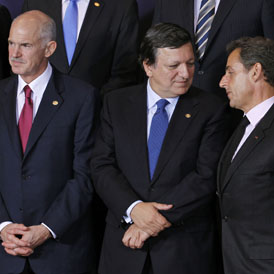EU leaders meet for crisis talks on Greece
 Siobhan Kennedy
Washington Correspondent
Siobhan Kennedy
Washington Correspondent
Europe’s leaders are tonight locked in crisis talks to try and rescue Greece, as signs of a tentative deal with lending banks emerged that could help stave off bankruptcy.
The 27 heads of states came together in Brussels for scheduled talks but with the fate of Greece hanging in the balance there will only be one thing on the agenda at tonight’s dinner.
Prime Minister David Cameron put on a brave face as he entered the talks, though his plan is to stay low key and contribute – financially at least – as little as possible.
While sources say he knows how critical tonight’s meeting will be, the Prime Minister will also seek to emphasise that Britain has no plans to pay anything towards a second mega-bail out for Greece, estimated to be worth at least 110 billion euros. But handing that cash over isn’t a given for Europe’s leaders either.

They have said they will only part with more money if Athens passes a fresh round of austerity measures and sells off a clutch of state-owned businesses.
Even then, the governments of France and Germany, among others, know they also have to persuade their banks – who between them are owed billions of euros by Greece – to give Athens more time to pay its debts.
Those were the critical discussion points on the table today during a key meeting of EU and International Monetary Fund inspectors and Evangelos Venizelos, Greek’s new Finance Minister – who was himself only drafted in to steer the crisis less than a week ago.
Tonight there were signs of progress after Mr Venizelos said some of Greece’s lending banks had agreed to extend payment times to give Athens more breathing room.
But the details of those agreements are yet to be ironed out and there are those in the financial markets who fear that extending existing loans would effectively mean Greece had defaulted on its debt – triggering the very financial crisis Europe’s leaders are seeking so desperately to avoid.
Mr Papendreou, Greece’s prime minister, seemed in affable mood tonight as he arrived for the crunch talks. But he knows that even if he secures new loans, he needs the Greek parliament – and his staunch Conservative opponents – to sign off on the next round of cuts before any cash is handed over. And that is by no means guaranteed.